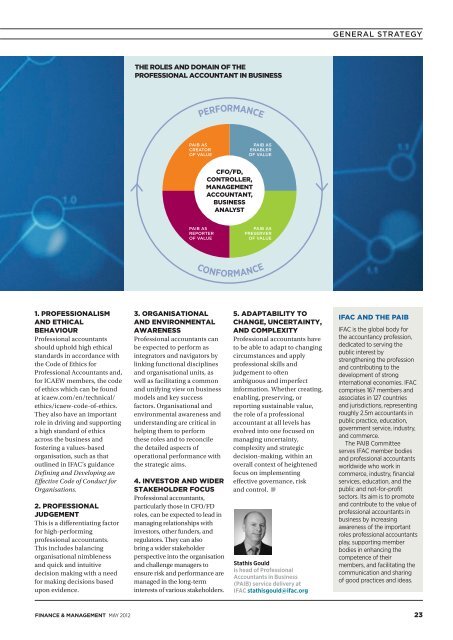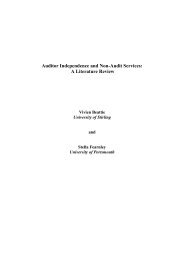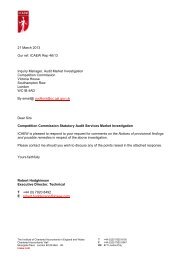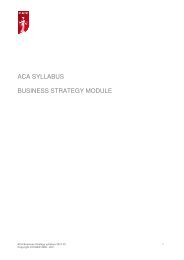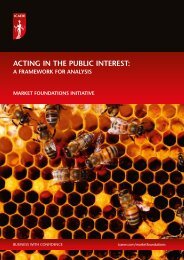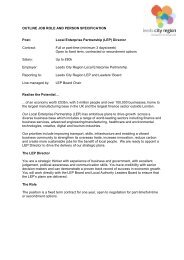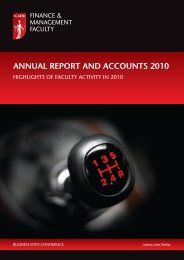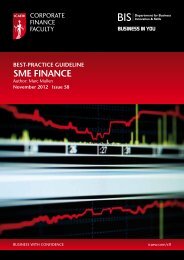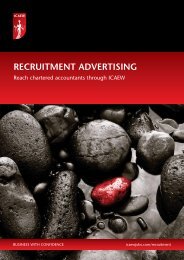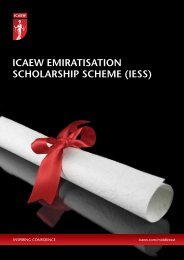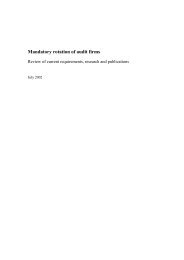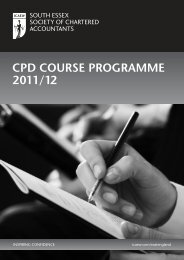Hit the road Positive leadership for troubled times - ICAEW
Hit the road Positive leadership for troubled times - ICAEW
Hit the road Positive leadership for troubled times - ICAEW
You also want an ePaper? Increase the reach of your titles
YUMPU automatically turns print PDFs into web optimized ePapers that Google loves.
GENERAL STRATEGY<br />
THE ROLES AND DOMAIN OF THE<br />
PROFESSIONAL ACCOUNTANT IN BUSINESS<br />
PERFORMANCE<br />
PAIB AS<br />
CREATOR<br />
OF VALUE<br />
PAIB AS<br />
ENABLER<br />
OF VALUE<br />
CFO/FD,<br />
CONTROLLER,<br />
MANAGEMENT<br />
ACCOUNTANT,<br />
BUSINESS<br />
ANALYST<br />
PAIB AS<br />
REPORTER<br />
OF VALUE<br />
PAIB AS<br />
PRESERVER<br />
OF VALUE<br />
CONFORMANCE<br />
1. PROFESSIONALISM<br />
AND ETHICAL<br />
BEHAVIOUR<br />
Professional accountants<br />
should uphold high ethical<br />
standards in accordance with<br />
<strong>the</strong> Code of Ethics <strong>for</strong><br />
Professional Accountants and,<br />
<strong>for</strong> <strong>ICAEW</strong> members, <strong>the</strong> code<br />
of ethics which can be found<br />
at icaew.com/en/technical/<br />
ethics/icaew-code-of-ethics.<br />
They also have an important<br />
role in driving and supporting<br />
a high standard of ethics<br />
across <strong>the</strong> business and<br />
fostering a values-based<br />
organisation, such as that<br />
outlined in IFAC’s guidance<br />
Defining and Developing an<br />
Effective Code of Conduct <strong>for</strong><br />
Organisations.<br />
2. PROFESSIONAL<br />
JUDGEMENT<br />
This is a differentiating factor<br />
<strong>for</strong> high-per<strong>for</strong>ming<br />
professional accountants.<br />
This includes balancing<br />
organisational nimbleness<br />
and quick and intuitive<br />
decision making with a need<br />
<strong>for</strong> making decisions based<br />
upon evidence.<br />
3. ORGANISATIONAL<br />
AND ENVIRONMENTAL<br />
AWARENESS<br />
Professional accountants can<br />
be expected to per<strong>for</strong>m as<br />
integrators and navigators by<br />
linking functional disciplines<br />
and organisational units, as<br />
well as facilitating a common<br />
and unifying view on business<br />
models and key success<br />
factors. Organisational and<br />
environmental awareness and<br />
understanding are critical in<br />
helping <strong>the</strong>m to per<strong>for</strong>m<br />
<strong>the</strong>se roles and to reconcile<br />
<strong>the</strong> detailed aspects of<br />
operational per<strong>for</strong>mance with<br />
<strong>the</strong> strategic aims.<br />
4. INVESTOR AND WIDER<br />
STAKEHOLDER FOCUS<br />
Professional accountants,<br />
particularly those in CFO/FD<br />
roles, can be expected to lead in<br />
managing relationships with<br />
investors, o<strong>the</strong>r funders, and<br />
regulators. They can also<br />
bring a wider stakeholder<br />
perspective into <strong>the</strong> organisation<br />
and challenge managers to<br />
ensure risk and per<strong>for</strong>mance are<br />
managed in <strong>the</strong> long-term<br />
interests of various stakeholders.<br />
5. ADAPTABILITY TO<br />
CHANGE, UNCERTAINTY,<br />
AND COMPLEXITY<br />
Professional accountants have<br />
to be able to adapt to changing<br />
circumstances and apply<br />
professional skills and<br />
judgement to often<br />
ambiguous and imperfect<br />
in<strong>for</strong>mation. Whe<strong>the</strong>r creating,<br />
enabling, preserving, or<br />
reporting sustainable value,<br />
<strong>the</strong> role of a professional<br />
accountant at all levels has<br />
evolved into one focused on<br />
managing uncertainty,<br />
complexity and strategic<br />
decision-making, within an<br />
overall context of heightened<br />
focus on implementing<br />
effective governance, risk<br />
and control.<br />
Stathis Gould<br />
is head of Professional<br />
Accountants in Business<br />
(PAIB) service delivery at<br />
IFAC stathisgould@ifac.org<br />
IFAC AND THE PAIB<br />
IFAC is <strong>the</strong> global body <strong>for</strong><br />
<strong>the</strong> accountancy profession,<br />
dedicated to serving <strong>the</strong><br />
public interest by<br />
streng<strong>the</strong>ning <strong>the</strong> profession<br />
and contributing to <strong>the</strong><br />
development of strong<br />
international economies. IFAC<br />
comprises 167 members and<br />
associates in 127 countries<br />
and jurisdictions, representing<br />
roughly 2.5m accountants in<br />
public practice, education,<br />
government service, industry,<br />
and commerce.<br />
The PAIB Committee<br />
serves IFAC member bodies<br />
and professional accountants<br />
worldwide who work in<br />
commerce, industry, financial<br />
services, education, and <strong>the</strong><br />
public and not-<strong>for</strong>-profit<br />
sectors. Its aim is to promote<br />
and contribute to <strong>the</strong> value of<br />
professional accountants in<br />
business by increasing<br />
awareness of <strong>the</strong> important<br />
roles professional accountants<br />
play, supporting member<br />
bodies in enhancing <strong>the</strong><br />
competence of <strong>the</strong>ir<br />
members, and facilitating <strong>the</strong><br />
communication and sharing<br />
of good practices and ideas.<br />
FINANCE & MANAGEMENT MAY 2012<br />
23


